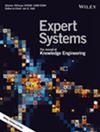Optimizing task allocation with temporal‐spatial privacy protection in mobile crowdsensing
IF 3
4区 计算机科学
Q2 COMPUTER SCIENCE, ARTIFICIAL INTELLIGENCE
引用次数: 0
Abstract
Mobile Crowdsensing (MCS) is considered to be a key emerging example of a smart city, which combines the wisdom of dynamic people with mobile devices to provide distributed, ubiquitous services and applications. In MCS, each worker tends to complete as many tasks as possible within the limited idle time to obtain higher income, while completing a task may require the worker to move to the specific location of the task and perform continuous sensing. Thus the time and location information of each worker is necessary for an efficient task allocation mechanism. However, submitting the time and location information of the workers to the system raises several privacy concerns, making it significant to protect both the temporal and spatial privacy of workers in MCS. In this article, we propose the Task Allocation with Temporal‐Spatial Privacy Protection (TASP) problem, aiming to maximize the total worker income to further improve the workers' motivation in executing tasks and the platform's utility, which is proved to be NP‐hard. We adopt differential privacy technology to introduce Laplace noise into the location and time information of workers, after which we propose the Improved Genetic Algorithm (SPGA) and the Clone‐Enhanced Genetic Algorithm (SPCGA), to solve the TASP problem. Experimental results on two real‐world datasets verify the effectiveness of the proposed SPGA and SPCGA with the required personalized privacy protection.在移动人群感应中优化任务分配,同时保护时空隐私
移动众感(MCS)被认为是智慧城市的一个重要新兴范例,它将动态人群的智慧与移动设备相结合,提供分布式、无处不在的服务和应用。在 MCS 中,每个工人都倾向于在有限的空闲时间内完成尽可能多的任务,以获得更高的收入,而完成一项任务可能需要工人移动到任务的特定地点并进行连续感知。因此,高效的任务分配机制需要每个工人的时间和位置信息。然而,将工人的时间和位置信息提交给系统会引发一些隐私问题,因此在 MCS 中保护工人的时间和空间隐私意义重大。在本文中,我们提出了带时空隐私保护的任务分配(TASP)问题,旨在使工人的总收入最大化,从而进一步提高工人执行任务的积极性和平台的效用。我们采用差分隐私技术在工人的位置和时间信息中引入拉普拉斯噪声,然后提出改进遗传算法(SPGA)和克隆增强遗传算法(SPCGA)来解决 TASP 问题。在两个真实世界数据集上的实验结果验证了所提出的 SPGA 和 SPCGA 在所需的个性化隐私保护方面的有效性。
本文章由计算机程序翻译,如有差异,请以英文原文为准。
求助全文
约1分钟内获得全文
求助全文
来源期刊

Expert Systems
工程技术-计算机:理论方法
CiteScore
7.40
自引率
6.10%
发文量
266
审稿时长
24 months
期刊介绍:
Expert Systems: The Journal of Knowledge Engineering publishes papers dealing with all aspects of knowledge engineering, including individual methods and techniques in knowledge acquisition and representation, and their application in the construction of systems – including expert systems – based thereon. Detailed scientific evaluation is an essential part of any paper.
As well as traditional application areas, such as Software and Requirements Engineering, Human-Computer Interaction, and Artificial Intelligence, we are aiming at the new and growing markets for these technologies, such as Business, Economy, Market Research, and Medical and Health Care. The shift towards this new focus will be marked by a series of special issues covering hot and emergent topics.
 求助内容:
求助内容: 应助结果提醒方式:
应助结果提醒方式:


